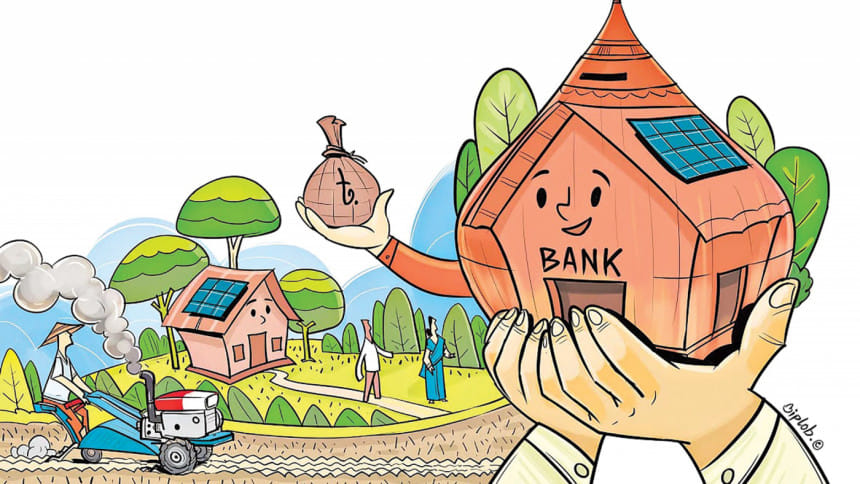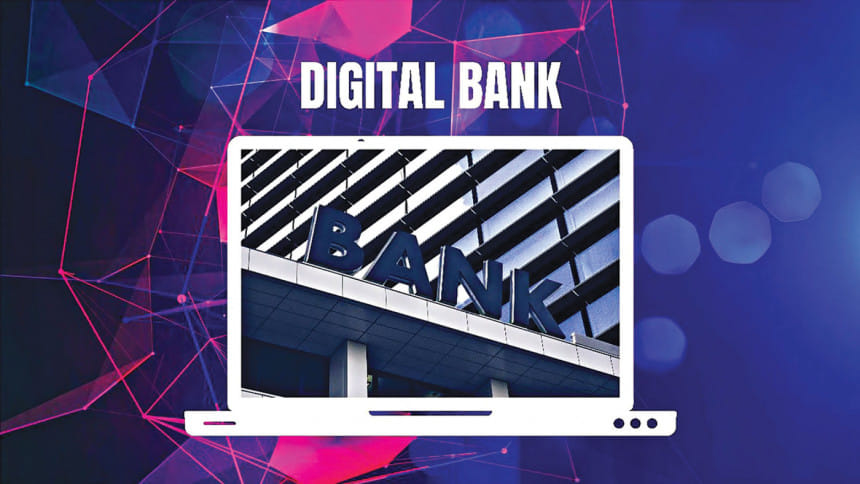Banking innovation key to prosperity

Banking, the lifeblood of any economy, faces unique challenges in Bangladesh. A high percentage of non-performing loans (NPLS), inadequate capital, and an overreliance on bank financing are just a few of the many obstacles impeding advancement. Ultimately, Bangladesh's banking industry's prosperity depends on its ability to navigate these obstacles and capitalise on its innovative spirit.
OBSTACLES ON THE PATH TO PROGRESS
Non-performing loans, or NPLs, are a lurking threat. The ratio of NPLs to total loans stood at 9.93 percent in Q1FY24 as per Bangladesh bank data. The ratio of non-performing loans for state-owned commercial banks (SCBs) was a staggering 21.70 percent and for private commercial banks (PCBs) it was 7.04 percent at the end of September 2023. Both these ratios are higher than the IMF set condition of an average NPL ratio below 10 percent for state-owned banks and below 5 percent for private commercial banks by June 2023. This not only restricts lending capacity but may also limit access to necessary funding.
Growth is further impeded by undercapitalisation, with the capital shortfall of 14 banks reaching a combined value of Tk 37,506 crore in the third quarter of 2023. As a result of vested interests making use of political ties, default loans are becoming more and more prevalent, further perpetuating the cycle of inefficiency. Far from recovering thousands of crores of the public's money and penalising the defaulters, the banks are instead giving them rescheduling benefits, with relatively low interest rates and long-term restructuring facilities.
But these are not the only obstacles prevailing in the banking landscape. Even though the nation has a strong entrepreneurial culture, start-ups, and small enterprises frequently struggle to get the funding they need to succeed. In addition, there is an overreliance on bank financing and banks remain hesitant to invest in long-term infrastructure projects due to concerns about exposure to credit risks and maturity mismatches. The stagnant bond market acts as a hurdle to achieving the country's infrastructure goals.

INNOVATION ACROSS THE VALUE CHAIN
Despite these obstacles, a surge of digital innovation is reshaping the financial landscape. Internet banking users soared 44.6 percent in FY 22-23, reaching 78.1 million, while mobile financial services (MFS) boast over 217 million subscribers in a population of 170 million as of October 2023. Initiatives like the interoperable Bangla QR and Binimoy platform paved the way for seamless digital transactions, connecting banks, MFS providers, and payment service providers in a unified ecosystem. Following all these digital shifts, Bangladesh Bank has aligned the nation's banking industry with the future of banking through digital banking guidelines and the recent issuance of digital banking licenses. As digital banking becomes more and more popular, security becomes paramount. Banks are aggressively investing in comprehensive cybersecurity measures, including data encryption, fraud detection systems, and intrusion prevention technology. Initiatives like the Guideline on ICT Security for Banks and FIs by Bangladesh Bank set the tone for a secure digital financial ecosystem.
AI-powered chatbots are revolutionising customer service by providing round-the-clock support for routine tasks, responding to inquiries, and resolving minor issues. Banks are continuously enhancing their mobile applications, creating one-stop platforms for a variety of financial needs. From account management and bill payments to investment options, Bangladeshis are increasingly taking control of their finances through their smartphones. BRAC Bank introduced the Astha Lifestyle digital banking super app in 2023, marking a first for the banking sector in Bangladesh.
A 2023 survey by PricewaterhouseCoopers (PwC) and the Association of Bankers, Bangladesh (ABB) revealed that 86 percent of participants gave process redesign and digitalisation top priority because they saw the opportunity for business development in retail banking, which is followed by corporate banking and SME. When asked to choose the most essential technological area in which they expect to spend in the upcoming years, API-enabled integration platforms were the top choice of 43 percent of the respondents. Investment in API-enabled platforms highlights a commitment to open banking and collaboration, further fuelling the digital revolution.
Disruption extends beyond mere payment processing to transforming customer onboarding, product design, and risk management. By FY22, 23 banks had completely adopted digital e-KYC onboarding, while 18 had only partially done so, according to Bangladesh Bank. As a consequence, the onboarding procedure that formerly took 4-5 days, now needs only 4-5 minutes. AI-powered credit assessment tools offered by Fintech are changing the game by assessing borrower credibility and enabling access to financing for high-potential ventures, promoting financial inclusion.

To increase liquidity in the country's banking sector, banks should also start discussions with foreign lenders for getting access to various purpose-driven credit lines. They can partner up with foreign institutions such as Multilateral Development Banks and subsequently channel the funds in the local market on the basis of certain given criteria. This measure would not only help banks broaden their sources of funds but would also help them adhere more to corporate and regulatory governance due to requirements of the credit line providers.
BEYOND TRADITIONAL LOANS AND PRODUCTS
The future of banking lies in expanding beyond traditional models. One such avenue is venture capital (VC) financing. The landscape of bank involvement in VC is constantly evolving globally. For venture capital-related projects, JPMorgan Chase, Capital One, and other leading banks have specialised investment arms. Innovative entrepreneurs, pursuing high-risk, high-reward ventures, often face a funding gap that VC investments can bridge. By venturing into the VC space alongside traditional loans, banks can help the emerging entrepreneurial ecosystem and stimulate economic growth.
Wealth management is another frontier with great promise. The number of bank accounts in Bangladesh with deposits above Tk 1 crore rose from 1,06,520 in September 2022 to 1,13,586 as of September 2023. With a 6.06 percent year-on-year increase in high-value bank accounts, Bangladesh is witnessing a surge in its affluent population. This presents a golden opportunity for financial institutions to offer tailor-made wealth management services. Imagine a one-stop solution including investment advice, personalised healthcare access, and seamless estate planning—a holistic approach that leverages existing customer relationships and unlocks new avenues for growth.
The introduction of bancassurance in March 2024 will provide Bangladesh's developing financial system with a new facet. This business strategy, which enables banks to sell insurance products within their branches, brings the convenience and trust associated with banking to the insurance industry. For Bangladesh, a nation with a comparatively low insurance penetration rate, this has enormous opportunity. Bancassurance may simplify the procedure and increase public knowledge of the advantages of insurance products by making them easily accessible to a larger audience. As a result, people and families may become more financially literate and have more security in the future.
The banking industry could also look into the derivatives market for hedging risks. An example of such would be to engage in currency swaps to manage their foreign currency exposure. This involves exchanging one currency for another for a specified period, providing liquidity and managing currency risk. The derivatives market in Bangladesh is highly untapped. To engage in the derivatives market, banks could establish specialised trading desks or offer derivative products to their clients, providing them with tailored solutions to manage their financial risks. However, it is crucial for banks to have a robust risk management framework in place, including sophisticated modelling and analytics, to navigate the complexities of the derivatives market and ensure prudent financial practices. By participating in the derivatives market, banks can enhance their ability to optimise returns, manage exposures, and offer comprehensive financial services to their clients.

Open banking is another growing concept gaining traction globally in which banks exchange financial information with approved third-party service providers with the approval of their clients. This opens the door for cutting-edge financial services and products that are customised to meet the demands of each individual, fostering a more dynamic and competitive financial market.
However, to ensure that such developments are effectively taking place, banks would also be required to spend heavily on R&D and capacity development. R&D would essentially include exploring emerging technologies from similar or model countries, understanding market trends, and proactively addressing future challenges. Investing in R&D ensures a proactive rather than reactive approach to innovation. Human resources would also have to be strongly trained so that they can themselves adapt to the innovations and also pass on new knowledge to the market. R&D and capacity development are areas in which the banking sector may work in close collaboration with the government.
THE KEY TO UNLOCKING PROSPERITY
Essentially, the banking sector should look forward to becoming a one-stop shop for all financial needs. There is no denying the difficulties, yet the banking industry's inventive spirit in Bangladesh offers optimism. It is imperative to tackle the key problems of NPLs by employing strong credit evaluation procedures and efficient debt settlement tactics. Enhancing governance by implementing measures for accountability and transparency can increase investor trust and unlock vital resources. Technology plays a crucial role in this transformative journey. Implementing an agile risk management framework, empowered by advanced analytics and fintech solutions, can mitigate credit risks and unlock avenues for infrastructure financing.
Bangladesh can turn its banking sector into a potent growth engine by embracing digitisation, investigating novel financial models like venture capital and wealth management, and fostering a culture of collaboration. This is not just about numbers or transactions; it's about empowering entrepreneurs and individuals, unlocking the potential of small businesses, nurturing a thriving economy, and building a brighter future for all.

 For all latest news, follow The Daily Star's Google News channel.
For all latest news, follow The Daily Star's Google News channel. 



Comments